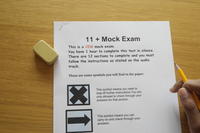Dealing with exam nerves
This is a subject that is very pertinent to me at the moment as it is mock 11 plus exam season, and 'A' levels and GCSEs are about to start. In fact children in year 11 seem to have been doing GCSE exams since September what with mock exams, speaking exams, ISAs, and preparing for preparing for the speaking exams and ISAs. Going back to the 11 plus mock exams, some children are doing mock exams on two Saturdays a month. No wonder they're stressed! So how can we help reduce this stress? The first thing to do is to try to get children to understand that failing an exam is not the end of the world. It really isn't! There are so many alternative educational routes these days that you don't have to pass the eleven plus, go to grammar school, get good 'O' levels (that dates me doesn't it?) then get good 'A' levels in order to do a university degree. Do you actually believe that it is going to be a tragedy if your child fails an exam? If you do, ask yourself if this is a rational belief to have. If you can get your perspective right then you stand more chance of helping your child to get their perspective right.
Although I've just said that failing an exam is not the end of the world, exams are still important and most children will have worked extremely hard to gain the knowledge needed to do well in them so it would be a shame to waste that by being poorly prepared for an exam. The first step in preparation is making sure that the child understands the subject. If there is a gap in their knowledge, what is the best way to fill it? Extra revision courses offered by the school? Text books? The Internet? A tutor? (I was asked recently to do a one-off two hour GCSE chemistry lesson).
The next step is setting up a revision timetable which is something I used to do for exams from Year 8 onwards (in Year 7 I didn't realise revision existed!). Instead of trying to do 5 hours a night or 10 hours during a whole day, go for a more realistic target of 2 hours a night (this if for older children, not kids taking the 11 plus - 20 minutes per night is fine for them!), perhaps divided into three 40-minute chunks. Personally, I found that 6-hours of good quality revision was about the maximum I could attain, this could be split into 3 sessions: morning, afternoon and evening, and breaks could be timetabled in to go for a run or a cycle ride. Having only to do two hours in the evening left time for some relaxation in front of the TV afterwards.
The day before an exam I recommend doing very little work, perhaps spending half an hour looking over revision notes and reassuring yourself you actually do know the subject. For my 11 plus tutees I recommend that they don't do any work the day before an exam.
The day of the exam: when I was at school there was a saying going round that "if you revised on the morning of an exam you would only remember what you revised that day and forget everything else" of course that's not true, but the point was that, as you had spent months or years preparing for the exam you were unlikely to gain anything else by revising that morning. On the morning of an exam it is important to be as relaxed as possible and this will be achieved in different ways by different people. I used to make sure I got to the exam venue in plenty of time, but rather than wait outside for ages, I used to go somewhere else until a few minutes before the exam. When I arrived outside the exam venue I used to look for people who I knew would not be stressing about the exam and go and have a chat with them.
Good luck to everyone doing exams in the next few months!



Comments